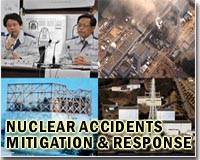 |
Tokyo (AFP) April 17, 2011 When a reactor at the Chernobyl nuclear plant exploded in April 1986, Japan dismissed public concerns over the safety of its atomic facilities, saying a comparable disaster would be "unthinkable" there. Two and a half decades on, a crisis at Japan's Fukushima Daiichi atomic plant has brought fears over the safety of nuclear power back to the surface in a country that still bears the scars of the world's first nuclear attack. A decision by Japan's nuclear safety authority to upgrade the Fukushima emergency to a maximum seven on an international scale of atomic crises last week has only increased public nervousness in the wake of the disaster. Japanese media were quick to point out that the new rating put the latest disaster on a par with Chernobyl, although officials say only 10 percent of the amount of radiation leaked in 1986 has so far escaped from the Fukushima plant. In terms of their impact on the population, the two disasters are wholly different. No one has died from exposure to radiation in Fukushima, while a 2005 UN report estimated that several thousand people were killed as a result of Chernobyl. The causes of the two disasters were also very different -- Fukushima was knocked out by the worst earthquake ever recorded in Japan and the huge tsunami that followed in its wake, while Chernobyl was blamed on human error. Nonetheless, for the Japanese public, the comparison with Chernobyl has raised the spectre of deserted landscapes, contaminated for decades, and thousands of people exposed to dangerous levels of radiation. Experts say the Fukushima disaster, which began when a huge earthquake and tsunami knocked out cooling systems at the plant on Japan's northeast coast, causing a series of explosions, will force the country to rethink its energy strategy. "The Fukushima disaster will inevitably reopen the debate in Japan and will change the future of nuclear power, of that you can be sure," said one industry specialist. "Plans for 14 more reactors between now and 2030 may be called into question." After Chernobyl, Japan, which with 32 active reactors was the fourth-largest producer of nuclear power in the world behind the United States, France and the Soviet Union, insisted its safety standards were higher than those in other countries. A year after the disaster, and despite widespread reservations, Japan put in place a strategy to double its nuclear power production by the year 2000. The country now has 55 atomic reactors, producing 30 percent of its total energy. With fossil fuels running scarce, and pressure to cut carbon dioxide emissions high, Japan must find a way to meet its energy needs. Experts believe that means it is unlikely to abandon nuclear power.
Share This Article With Planet Earth
Related Links Bringing Order To A World Of Disasters A world of storm and tempest When the Earth Quakes
 Chernobyl nightmare haunts world 25 years on
Chernobyl nightmare haunts world 25 years onKiev (AFP) April 17, 2011 The world next week remembers 25 years since the worst nuclear accident in history at Chernobyl, haunted by fears that the Japan earthquake has shown again the risk of atomic power sparking apocalypse. Chernobyl has become a byword for environmental catastrophe, with the explosion at 1:23 am on April 26, 1986 realising the worst nightmare of what can happen when a nuclear power plant goes wr ... read more |
|
| The content herein, unless otherwise known to be public domain, are Copyright 1995-2010 - SpaceDaily. AFP and UPI Wire Stories are copyright Agence France-Presse and United Press International. ESA Portal Reports are copyright European Space Agency. All NASA sourced material is public domain. Additional copyrights may apply in whole or part to other bona fide parties. Advertising does not imply endorsement,agreement or approval of any opinions, statements or information provided by SpaceDaily on any Web page published or hosted by SpaceDaily. Privacy Statement |